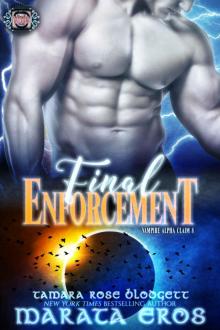- Home
- Eros, Marata
The Token 8: Kiki: A Billionaire Dark Romantic Suspense Page 13
The Token 8: Kiki: A Billionaire Dark Romantic Suspense Read online
Page 13
Suddenly, the background of murmured condolences, china and glass clanking . . . my home full of strangers, is too much.
I stand. All I see is black. I can't see the colors of my family for the sea of black mourners who fill every corner of my house.
I choke on my grief.
Marshal Clearwater sees me, his eyes meet mine.
No one else does.
His face grows alarmed as he sets his dish on the edge of the coffee table. Black eyes grow larger as he draws nearer, weaving through the bodies in black. My breath comes hard and fast.
“Hey,” he says as he moves between the last people blocking his way to me.
I can't breathe; something heavy is on my chest.
“What's wrong with her?” I hear Lacey ask in a tight voice, her concerned hazel eyes above mine.
I'm on the ground now, a tight wheeze the only breath that comes through.
People crowd.
“Step back,” Clearwater says in a voice like a bell.
“Deca—” the big Fed begins.
“Hyperventilating,” Clearwater says in terse reply.
My eyes roll to that package from Aunt Milli. It tumbles from my fingers. My panic rises in my eyes, tightening my chest further.
“I'm here, Brooke,” Marshal Clearwater says, those dark eyes never leaving mine. “Breathe slowly . . .”
He sees me glance at the package.
Clearwater picks it up and sets it in my hand. Tears squeeze out of my eyes, running down each side of my face, pooling in my ears.
“Jesus . . . Brooke,” Lacey says, dabbing at the tears, her own mingling with mine as she gives Clearwater a dark look, like he's the enemy, not my grief. Always ready to champion me, defend me against all comers.
I stare into Marshal Clearwater's eyes. Thanking him without speaking.
The corners of the Fed's eyes crinkle as he looks into mine. “You're welcome.”
My hand holds the small package tighter as my breath comes in a sudden whoosh.
“There you go,” Clearwater says as eyes stare at me as I lay on the floor of our living room, needles from the Christmas tree making it smell like pine.
I take another breath . . . Another. They hurt.
He holds out his hands and I take one, Lacey takes the other.
They pull me up. I turn and scoop up the package again.
I steady myself, slightly dizzy. Feeling like the lamest of fools. “I need some air,” I say, head down.
Clearwater nods. His partner's rootbeer brown eyes follow me out to the patio that overlooks Puget Sound. I let the smell of the sea overwhelm me as I lean against the railing, Lacey at my back.
“Brooke . . .” she begins and I hold up my palm. She continues anyway. “They mean well.” Lacey looks at me as she always does: determined to fix my problems, or just determined.
I nod. I know.
I look over the water. How everything around me appears so normal. People walking in the chilled rain. Leaves lingering in trees too stubborn to release them.
The waves churning in angry abandon.
None of it cares that time doesn't move forward for those who grieve.
My chin dips to my chest and I sit down on the patio furniture, the temperature too cold for my light outfit of a simple black wrap dress, heels, and thin nylons. It's what I can manage.
All I can manage. Oh yeah, I brushed my teeth. I give a little hiccupy laugh.
Slowly, Lacey lowers herself opposite me. I look at her, round eyes meet mine, dark blond hair frames a face I've known since infancy, through dolls, makeup, boyfriends and now—death. “You don't have to do this, y'know.”
I nod. I know.
“The police have handed it over to the Feds . . . and they don't have any questions for me. I've been cleared,” I say and laugh. “So . . . it’s time.” Time to escape the inescapable; my guilt will get packed along with the rest of my emotional baggage. I take it wherever I go.
It sounds kinda like a sob.
Lacey reaches out and takes my hand.
“I'll miss you.” Her eyes search mine. “And for what it's worth, I think it's too soon. And, Brookie . . .”
Her use of my nickname makes a fat tear brim and roll from my swollen eyes.
“Your music,” she whispers.
“Fuck my music. I don't ever want to see another piano again,” I say with conviction birthed from pain. My voice comes out like a raw wound and Lacey flinches.
I inhale deeply, the cold salt in the air soothing my lungs, invigorating me.
“A fresh start, Lacey. It's what I need. No more music, no more . . . expectations.” I fling my hand around at the house.
“You don't have to sell this place,” Lacey says in a low voice.
“Why would I keep it?” I ask with heavy sarcasm. “What do I have to come home to?” I hiss, embracing my anger.
Stages of grief, y'know. Of course, the experts don't say how long each stage is, do they?
I think the anger stage will be awhile.
“And school?” Lacey cocks a brow and I cringe inside a little. Even though everyone at the university understands, the tragedy of my family’s death has sensationalized the small community of pianists. I am no longer a fellow pianist but tabloid fodder . . . the poor little girl forever marked by a brutal tragedy. Once a top contender for Juilliard, my hard-earned respect is now overshadowed by the infamous killings that seem to define me now.
Juilliard could suck it, there would be another . . . golden girl. Or guy. I fold my arms and Lacey knows when she's lost. Juilliard can’t have me now . . . because—I can’t have them. Music and the memories of my family are inexplicably linked. It's what I deserve, anyway. Why did I get to live when none of them did? I should have been here. Should have been with them.
“Okay,” she says in a quiet voice. “But you promise me . . . Promise me that you'll come back.”
Tears of anger masking my sadness run down my face. “I can't, Lace. I can't.” How can I play piano when they can't listen? How can I live here again when every space I breathe in has their absence in it? There would never be enough oxygen for me.
“Miss Starr,” Marshal Clearwater interrupts us.
I clear my throat, swiping at my wet face, which heats with embarrassment. “Yes,” I say.
He pauses, those dark eyes probing my own. “I'm sorry for your loss.”
I nod, expecting more . . . then he says the first positive thing I've heard, surprising me. “And good luck in Alaska.”
My hands tighten around the small box from Aunt Milli and I give the first smile of this miserable day of memorial for my murdered family.
“Thank you,” I say, the damp sea breeze lifting the hair at my neck.
He stares at me a moment longer, looking as if he wants to say more. Then he walks away.
Like everyone else.
My hands slide into that box and wrap around the present inside.
My flesh heats the solid brass key.
I hang on to it like the anchor of comfort it is.
It's hold on or sink.
1
May
Homer, Alaska
I cover my nose then cough. A plume of dust rises and I drop my hand.
What a dump.
I hear a horn beep and turn around. The taxi driver who gave me the ride from ERA, the local aircarrier, waves.
I give him the thumbs-up and he drives off. My eyes shift back to the run-down log cabin. I keep my eyes on the wide plank door as I climb the thick steps, the deep graining and knots in the wood, loved by age, mellowed to amber- greet me. I look down at the key in my hand, wrapping suddenly cold fingers around brass that's stolen my warmth. I slide the gift from Milli into the surface lock and the tumblers slide and click apart. I push the heavy door inward and it opens with a whisper of sound.
The interior is as dismal as I expect.
Everywhere my eyes land is caked in dirt. Years of dust entomb every surface.
I sigh, trudge out to the cabin’s porch and carry in my suitcases one by one, four in all. I swipe the screen of my smartphone and see that it receives Internet.
Amazing.
Back on the porch, I scan the forty-acre spread, as open as it is achingly cloistered. The spruce trees scattered on the edge of a huge cliff accentuate the lonely frontier feel. Wild lupine shows green against grass that isn't awake with the late spring of this northern latitude. Fireweed shoots emerge between patches of snow.
I exhale sadly and haul the rest of my gear inside and survey the interior again.
Yup, it's still shitty.
I set my phone on the kitchen table , disturbing the dust, and put my things on the floor. I move to a crooked cupboard and open it, then open the rest, one by one. I leave them standing open like gaping, toothless mouths.
My eye catches something and I stand up straighter. In the vast nothingness of the lower kitchen cupboards I see a spot of color. I move closer.
It's a quilt. Large circles intertwine with one another, the patchwork reminiscent of the post–WWII era.
I know what kind of quilt it is: wedding ring.
My great-aunt Milli has slept beneath this. When she was younger than I am now.
A tight burning sensation begins deep in my chest and I know better than to contain it. I let the silent, unstoppable tears come.
The wildlife of my property doesn't mind my grief. I stand in the middle of my new home, clutching a quilt my great-aunt made with her own hands, knowing that this cabin is mine through the default of her death.
I wonder if I'll ever be right again.
I don't deserve happiness. Because they can never have it again.
After an indefinite time, I lay the quilt over a ratty couch and lie down.
I fall asleep before my head hits the cushioned armrest.
My nose twitches at the musty smell.
My crushed heart still beats.
Somehow.
I wake with birds chirping outside the window. The pale light showcases things that though neglected were once loved. My eyes scan the scarred surfaces of antique dressers forgotten, mirrors whose silvered surfaces toss the light around the space. Pale green paint, like untouched sherbet, is crazed on the moldings that hold doors that have faded to a light amber. So much potential . . . so much age. So much. I shiver and roll over.
Potential doesn't keep me warm. I'm freezing my ass off. I sit up on the couch, the sunlight gray as it filters through the grimy glass of the cabin. Divided light windows settle into the center of enormous old log walls that intersect at the cabin's corners, the glass rippled , ancient. It looks like water's running over the panes. It's not, they're just that old.
I look around the interior again and stretch, yawning. My gaze stumbles on an old Toyo heating stove, maybe updated as recently as the 1970s.
Wonderful.
I move to it, arms folded over my chest, hugging my elbows. I crank the knob to on then hit a switch at the back of the old-fashioned stove. My eyes follow the flue as it snakes its way from the main body of the stove and plunges through the tall ceiling. It creaks to miserable life, ticking as it wakes up.
I realize that I don't know how it's being fueled and look to a fireplace, open and dark. Rough-hewn logs flank its sides and a matching log, split in half, acts as a mantel. The spruce has aged to a polished soft gold.
Of course, I'm just guessing at the color because everything is vintage beautiful with a layer of gray. And epic dust.
I sneeze and stand by the stove until it's too hot for me to tolerate. I move away.
Well, I guess this answers the question of propane delivery, I think. I move aside a moth-eaten lace curtain, and my eyes immediately peg a rusty old tank in the backyard, peeling paint completing the rustic yard ornament. I let the curtain drop and walk over to the kitchen, which is part of the living room. My eyes move to the pair of doors that line the back wall and I walk over there, my exploring not quite finished. I push open the door to the right, the hinges protest softly and I catch sight of a shower pan with a curtain hanging off of eye hook of nickel that's worn thin to reveal brass. A steady drip of water falls, the sound exploding in a dull pop as it lands in the old porcelain cast iron. The commode stands in forlorn silence in the corner, a small window set high above it. To the right, a wall mount sink hangs off the log with a long chrome chain from the center of the taps that holds a rubber stopper at its end. I sigh, stepping back and shutting the door at the lovely vista. I turn in the tiny open hall, with just a partial wall that divides the kitchen from the small rooms. I move through the door at the left of the bathroom and a small bedroom stands before me. A full-sized bed, without bed linen, a small nightstand and two tiny windows, one at the north side and one at the south, open casement style round out the spartan room. A lonely glass kerosene lamp sits in a layer of dust on the nightstand. I back out, closing the door I sigh again.
This place is nothing like my parents’ six-thousand-square-foot home that I've sold. Out in the nothingness of this property, I could be at the end of the earth.
I feel like I am.
I walk back into the kitchen.I swallow hard and turn on the faucet above an ancient porcelain farmhouse sink. Cold water pours out from solid nickel taps, the metal frosting.
I put my hand underneath the rush and snatch it back. It's so cold it burns.
I might as well be in a foreign country, I think.
I shut off the water just as I hear an engine.
I open the door and quickly shut it behind me; don't want that precious heat to escape.
I watch a 1970s Bronco pull up the long winding drive and come to a stop. It’s hauling a trailer with the car I just bought, sight unseen. A burly and disheveled guy exits his red-and-white rig. At least, I think it’s red and white, but it’s hard to tell through the dirt, not to mention the rust that’s eating at the wheel wells and edges of it like cancer.
“Hi ya!” he says and gives a friendly wave. I give a little wave back and make my way down the broad split-log staircase to meet him in the center of the driveway, the gravel lost to the weeds long ago.
“I'm Tucker,” he says, sticking out a meaty hand, and I shake it as he vigorously pumps mine. I look at him, trying to reconcile his email correspondence with the face.
I've been raised to be socially gracious. In fact, I'm comfortable around most, but . . . the people of Alaska have proven to be an exception.
There's no pretense and I find I miss it. Or maybe it's what is familiar?
Tucker ignores my inspection of him as he takes in my great-aunt's homestead.
I use this opportunity to look him over, from his strange knee-height brown rubber boots to his camel-colored heavy denim pants that meet a beat-up T-shirt that says Catch More But at Sea.
What?
When I reach his face, I see his head is partially covered by a cap made of nubby charcoal-colored wool, pulled on haphazardly, strands of dark hair curling around the rolled brim.
His eyes are warm when they meet mine and I blush as he gives a belly laugh at my perusal. “Like what ya see?” he asks, waggling his brows.
Dear Lord.
“Ah . . . I'm . . .” Oh God.
“It's okay.” He smiles, letting me off the hook. “I hear your old Milli's niece . . .”
I nod numbly. Don't ask, don't ask . . .
“Brooke Starr,” I say, my face heating again. I feel certifiably stupid.
Tucker grins. “How is the old girl doing?”
He's asked.
I give a small squeak and he says in a low voice, “Is she gone, then?”
I nod again and he reaches out a large hand, the whole of it swallows my shoulder. “It's all right, Brooke,” he says, his eyes moving to take in the vast property, the sweeping cliffs that hold jagged rocks that meet the sea. “She had a full life, y'know.”
I breath
e out a sigh of relief, . I don't fool Tucker. He studies my expression then inclines his head, not questioning me further.
Suddenly, he grins. “I guess you want to see her.”
Her?
He chuckles at my expression. “Cars are always referred to as females.”
Not by me, I think. The best I can do is think of my Scion as That Which Runs. A small giggle escapes me and Tucker glances over his shoulder with a cocked brow.
He moves to the back of the trailer that holds the three thousand dollars’ worth of metal. With a flourish he jerks off the car cover. My eyes widen, roving over the vintage VW bus. The car does me in. The photo he sent me over the Internet looked . . . different. A caption—1967 VW bus, needs body work—had appeared alongside an image of a gunmetal vehicle.
“What . . . how?” I stutter as I take in the huge rainbow-colored flowers over the deep cerulean blue paint, a low glitter winking as the fog departs the property and the sun edges in. I sigh.
“Beautiful, ain't she?” Tucker asks, running his hand over the psychedelic yawn of a paint job.
I want to blend in, exist unnoticed among the huge influx of migrant fishing workers.
This Scooby Doo bus is not going to fucking blend in.
I open my mouth to rake him over my blazing anger, but his sweet expression stops me. Tucker straightens. “What? Ya don't like it?” he asks.
The primer gray would have been perfect. I bite my lip and he waits.
“It's okay,” I say.
“Hell, yeah!” Tucker enthuses and I smile wanly.
“Okay, just let me unhitch her and you can take a look . . .”
Tucker backs the bus off the trailer. He gets all four wheels on the bare stretch of pastured driveway and gives it a start while I move to the side of the house, out of the way. It’s then that I catch sight of the outhouse around the back of the small cabin for the first time, and a laugh bursts out of me before I can stop it.
Tucker exits the bus and walks around to meet me. He gives another smile. “That's the shitter?”
I stare at it in disbelief. “The necessary,” I reply primly, and he belly laughs.

 Vampire (Alpha Claim 8-Final Enforcement): New Adult Paranormal Romance (Vampire Alpha Claim)
Vampire (Alpha Claim 8-Final Enforcement): New Adult Paranormal Romance (Vampire Alpha Claim) The Token 5 (New Adult Dark Romance)
The Token 5 (New Adult Dark Romance) The Druid Breeders 4-Book Bundle
The Druid Breeders 4-Book Bundle Exotic (The Druid Breeders Series, #7.5)
Exotic (The Druid Breeders Series, #7.5) The Siren Series 3: Brandon (A Siren Novel)
The Siren Series 3: Brandon (A Siren Novel) A Terrible Love
A Terrible Love The Token 6 (New Adult Dark Romance)
The Token 6 (New Adult Dark Romance) The Token 8: Kiki: A Billionaire Dark Romantic Suspense
The Token 8: Kiki: A Billionaire Dark Romantic Suspense The Token 7: Thorn (A Token Novel)
The Token 7: Thorn (A Token Novel) The Token 3 (New Adult Dark Romance)
The Token 3 (New Adult Dark Romance)